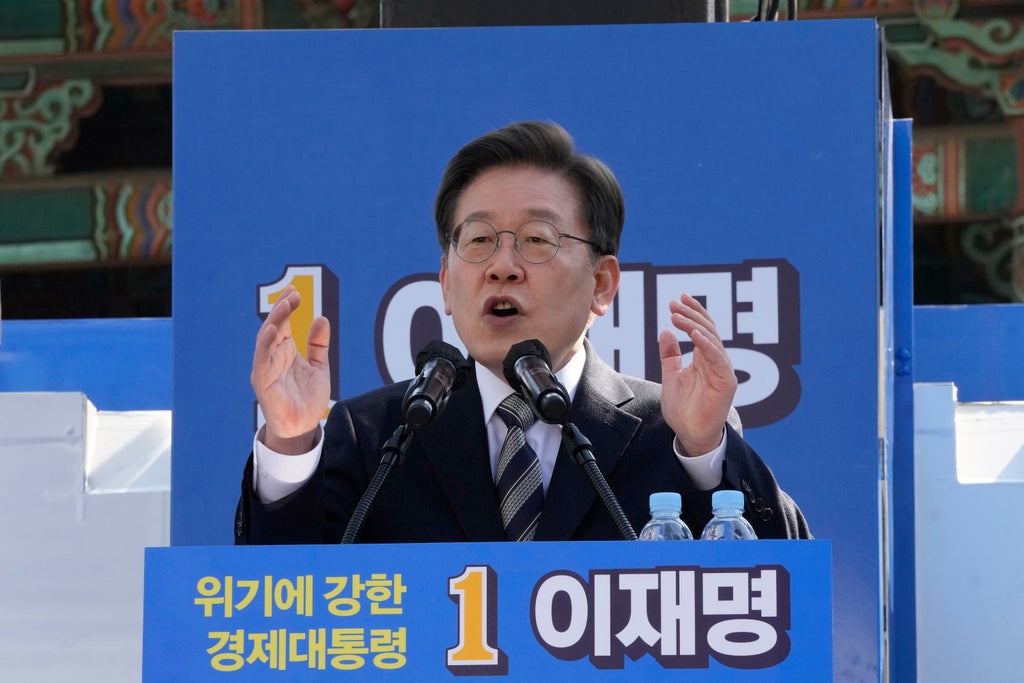
An unusually bitter election season in South Korea culminates on Wednesday when tens of millions of voters pick their next president.
The winner, who will be sworn into office in May and serve one five-year term, will face crucial challenges as the leader of a fast-aging nation that's grappling with economic inequalities, soaring debt and a growing North Korean nuclear threat.
Here's a look at the two main candidates ahead of the vote:
___
LEE JAE-MYUNG
The ruling Democratic Party’s hopes for producing back-to-back presidents lie with a firebrand former governor who promises universal basic income and engagement with rival North Korea.
Lee Jae-myung’s supporters adore his outspoken style and see him as an anti-elitist hero who could fix establishment politics, eradicate corruption and solve growing economic inequality, a decaying job market and soaring house prices.
To critics, the 57-year-old is a dangerous populist who relies on stoking division and demonizing his conservative opponents while failing to back his ambitious vows for welfare spending with realistic funding plans.
Tensions created by North Korea’s accelerating missile tests this year are also complicating Lee’s plans to inherit the foreign policy of current President Moon Jae-in. Moon's dovish attempts at inter-Korean rapprochement fell apart with the collapse of nuclear disarmament talks between Washington and Pyongyang in 2019.
A former governor of South Korea’s most populous Gyeonggi Province, Lee has highlighted his struggles as a poor factory worker and later a labor rights lawyer before joining the center-left party in 2005. He has touted the social welfare programs and reforms he began while serving as mayor of Seongnam city from 2010 to 2018, and then as Gyeonggi governor between 2018 and 2021, which he says prepared him to “root out unfairness, inequality and corruption.”
Lee proposes a universal basic income policy that would eventually provide every South Korean an annual payment of 1 million won ($820) and plans to adopt a new type of property tax to help fund the payments. He also promises additional payments for young adults under 30, senior citizens in their 60s and older, and vulnerable groups like farmers, fishermen and artists.
On foreign policy, Lee has vowed to continue Moon’s conciliatory approach toward North Korea and questioned the effectiveness of U.S.-led economic sanctions in pressuring Pyongyang to abandon its nuclear weapons program. On tensions between Washington and Beijing, Lee says South Korea should not be forced to choose between its treaty ally and largest trading partner, respectively.
Lee has been dogged by controversy surrounding a recorded telephone conversation where he verbally abused his sister-in-law in 2012 over a family dispute. He also faced accusations that he abused his power as Seongnam mayor to force his late brother into a mental institution that year, but he was acquitted of those charges in 2020.
Lee has denied involvement in a dubious development project launched in Seongnam during his time as mayor that raised suspicions of corrupt ties between city officials, politicians and a small asset management firm which reaped a huge profit. Several former city officials and businessmen and an ex-lawmaker have been arrested over bribery and other suspicions amid an ongoing investigation into the case.
___
YOON SUK YEOL
Yoon Suk Yeol, 61, is a former top prosecutor who's looking to restore conservative rule. He promises to win stronger U.S. security commitments to neutralize North Korean nuclear threats and to take a more assertive stance on China.
A novice in party politics, Yoon served as Moon’s popular prosecutor general. He spearheaded high-profile corruption investigations of past conservative governments. But he resigned in 2021 and joined the conservative People Power Party following infighting over his probes on Moon allies.
He has spent most of his 27-year professional career as a state prosecutor, and faces criticism that his untested and forceful style of leadership would fail to steer South Korea out of complex security and economic challenges. He says he would appoint experienced advisers and let them handle key affairs that require expertise.
If elected, some experts say Yoon may enjoy a greater honeymoon period with the public than Lee, as many opinion surveys show that more than half of people polled want a shift in power. It’s still unclear whether he could translate that into legislative reform steps because Lee’s party still holds nearly 60% of seats in the 295-member parliament.
Yoon has accused Moon’s government of tilting toward North Korea and China, and says that undermines South Korea’s decades-long alliance with the United States.
To cope with North Korea’s nuclear advancements, Yoon has vowed to seek stronger “U.S. extended deterrence,” a reference to Washington's ability to use military and nuclear forces to deter assaults on its allies. He said he would launch preemptive strikes on North Korea if it shows signs of imminent attack — comments that Lee said were unnecessarily provoking to North Korea.
Yoon also said he would provide more than 2.5 million housing units to suppress soaring housing prices, offer financial aid packages to small business owners hit by pandemic restrictions and drastically raise salaries for conscript soldiers.
Yoon has built an image as a strong-minded, uncompromising prosecutor. During a parliament audit in 2013, Yoon, then a senior prosecutor, revealed he was pressured by his boss over an investigation into an allegation that the country’s spy agency had conducted an illicit online campaign to help conservative President Park Geun-hye win the previous year's election. At the time, he famously said, “I’m not loyal to (high-level) people.”
He was demoted, but when Park’s government was toppled over a separate corruption scandal in 2017, President Moon made Yoon head of a Seoul prosecution office, which investigated Park and other conservative leaders. Yoon was named Moon’s prosecutor general in 2019.
In 2017, Lee, then Seongnam mayor, said he wanted to make Yoon his prosecutor general if he became president. He now says that a Yoon government would begin a “prosecutors’ dictatorship that is scarier than past military-backed governments.”


.png?w=600)




